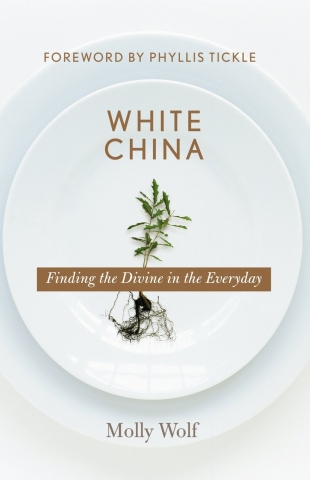Molly Wolf is the founder of the website Sabbath-Blessings.org and coauthor with Linda Roghaar of Knitlit and Knitlit 2. She lives in Kingston, Ontario, Canada, with her two adult sons and three cats. We were very taken with her musings in A Place Like Any Other: Sabbath Blessings.
In this collection of essays, Wolf continues to unpack the spiritual meanings in her everyday life. This delightful and pensive work is divided into sections on Creation, Being Human, Truths and Illusions, Answered Prayers, Saints Ancient and Modern, Lighten Our Darkness, Last Things, and God-Stuff. Wolf explains the operating principle behind her Christian probes: "Unpacking is what this book is about. I started with a small white china figurine of Christ's mother, Mary, and when I unpacked her she turned into someone who was not in the least small or white or china, but big, warm, vibrant, earthy, real, passionate, alive person, one who is my sister in the skin. Then her choice to say 'yes 'to God became intensely up close and personal to me. That, I believe, is what good God-Talk is about: unpacking terms and concepts and making them real. It's making the rubber hit the road."
Any thinking Christian will find the author's brand of everyday spirituality to be salutary and substantive whether she's writing about leaves, praying, chocolate, mud season, dental appointments, or ropes and cooties. She captures one of our challenges in this passage: "Our sense of outrage goes back to the sense of entitlement we never quite outgrow. I am good and deserving, and I want X and deserve X, and if I don't get X then there's something wrong with the world, not with me. The more we concentrate on our own rights and the other guy's wrongs (in both senses of right and wrong), the deeper we dig ourselves into the combined state of entitlement and disappointment that leads straight into those good old sins of pride and anger." Wolf also makes a good point when she shows how our sense of fairness is upended by God's unconditional grace.
Although on a Christian path, the author has respect for other religions and is buoyed by their common emphasis on virtues such as compassion, justice, forgiveness, and love. But she is best in digging beneath her ordinary experiences. Here is an example:
"What I do know is that using this teapot always propels me into a sort of mindfulness, forcing me to stop in my tracks and think about things I don't always give enough attention to: the poverty of third-world workers and their often horrible working conditions, for instance. Have I fed the pattern by buying this ware, or have I merely contributed my money to an economy that needs it? When I pour tea from this pot, I am acutely aware of the hands that made it, decorated it, glazed it, fired it, set it to cool, packed it. Were these people happy, or miserable, or just doing their job with their mind on more important things? I hope they take some satisfaction in producing this stuff. But again, I don't know. . . . Maybe what my teapot is supposed to do in my life is cultivate this sort of mindfulness, to remind me to be painfully, lovingly aware of this world's real suffering beauty and of my own prejudice and blinkered vision. Its humility should keep me humble; its beauty should remind me of delight."
